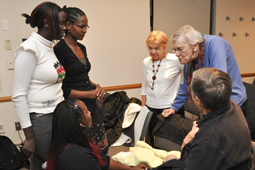'Small Act' discussion focuses on unlikely givers
Sillerman Center researcher spoke of ripple effects of charitable giving

Members of the audience discussing the film "A Small Act" with panelists (from left) Pamela Kimkung, Judith Juliet Njoka and Esther Kamau
The Social Justice Leadership Series presented the documentary “A Small Act,” an official selection at the 2010 Sundance Film Festival, at Brandeis Nov. 17. Directed by Jennifer Arnold, the documentary tells the story of two very unlikely philanthropists – one a Holocaust survivor, the other a young Kenyan man – whose modest acts of charity shine a light on the incredible power of giving—no matter how small the gift.
Elenore Garton, senior researcher at the Sillerman Center for the Advancement of Philanthropy, set the stage for the film screening in opening remarks, noting the ripple effect of charitable giving, a central theme of the documentary.
Chris Mburu was a child living in a village in Kenya when he first received a $15 scholarship from a Swedish woman named Hilde Back. Her humble but steady sponsorship put Chris through school and eventually launched him into Harvard Law School, paving the way to his job as a United Nations attorney focused on human rights, anti-discrimination, and genocide.
Years later, Chris launched his own small act of benevolence -- the Hilde Back Education Fund for the children of his home territory. When he met Hilde, now in her 80s, he discovered she is not just a Swedish schoolteacher but a German Jew who escaped the Holocaust.
The screening of “A Small Act” was followed by a discussion with three Kenyan students studying at the Heller School, each of whom has experience in Kenya in education, development or government.
Judith Juliet Njoka of the Coexistence and Conflict program, and Esther Kamau and Pamela Kimkung, both of the Sustainable International Development program, helped the audience of Brandeis students and local community members understand the context in which the events of the film took place, and answered questions that addressed some of the most persistent questions related to development and charitable giving in Kenya and around the world:
- What accounts for the poor academic performance of many of the students shown in the film? Is inferior teacher preparation responsible for student failure in the primary school-leaving examination? What is the impact of poor teacher pay? Do teachers prefer urban areas instead of rural areas without electricity? What about the conditions, including a lack of books and other materials, and hungry children who in some cases must walk long distances just to get to school?
- Are competitively awarded education scholarships, such as the Hilde Back Education Fund shown in the film, entirely beneficial for communities, or might they have destructive effects as well? Do scholarship recipients ultimately benefit their communities as a whole, or do these programs lead to the absence of the most successful children from their home communities?
- Does the curriculum and format of the education provided to these children respect the values and advantages of indigenous forms of education, and local kinds of knowledge and understandings of the world? Should a child’s success be based solely on his/her success in an educational model based largely on the system of Kenya’s former colonizers?
- Where are the men of the communities that are featured in the film, which shows many children being brought up by their mothers and grandmothers? The panelists noted that in the central part of Kenya it is common that men have left for lack of economic opportunities, particularly as traditional ways of supporting a family, such as hunting, have disappeared.
The discussion raised more questions than it answered. But as panelist Kimkung said later, “This film shows a life we live and experience every day in Kenya. It is empowering to talk about it and raise these questions.”
This was a Social Justice Leadership Series event, hosted by the International Center for Ethics, Justice, and Public Life and the Schuster Institute for Investigative Journalism [http://www.brandeis.edu/investigate/], and was cosponsored by the Sillerman Center for the Advancement of Philanthropy and Facing History and Ourselves.
The panelists:
Judith Juliet Njoka is pursuing her MA in Coexistence and Conflict Resolution at Brandeis. Back in Kenya she worked with the City Council of Nairobi and interned at the Regional Center for Mapping Resources for Development. She graduated from Kenyatta University in 2009 with a Bachelor’s Degree in Environmental Planning and Management in 2009.
Esther Kamau is a World Bank Scholar from central Kenya studying in the Sustainable International Development Masters program at the Heller School for Social policy and Management at Brandeis. Most recently she worked at World Vision as a Program Manager, where she was responsible for leading and coordinating a team to implement various development projects including education, health, HIV and AIDS response, and water projects.
Pamela Kimkung is currently a Masters candidate in SID and is a Ford Foundation fellow. She holds a BA in Education from Kenyatta University and has experience as a high school headmistress and in girls’ education. She has worked for World Vision, where she was a project coordinator for an anti-female genital mutilation project.
Categories: Humanities and Social Sciences, International Affairs





